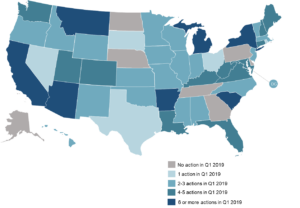The 50 States of Solar Report Q1 2019 Update Report
43 States and D.C. Took Action on Distributed Solar Policy and Rate Design During Q1 2019
Raleigh, N.C. – (April 24, 2019) The N.C. Clean Energy Technology Center (NCCETC) released its Q1 2019 edition of The 50 States of Solar. The quarterly series provides insights on state regulatory and legislative discussions and actions on distributed solar policy, with a focus on net metering, distributed solar valuation, community solar, residential fixed charges, residential demand and solar charges, third-party ownership, and utility-led rooftop solar programs.
The report finds that 43 states, plus the District of Columbia and Puerto Rico took some type of distributed solar policy action during Q1 2019 (see figure below), with the greatest number of actions relating to net metering policies, residential fixed charge or minimum bill increases, and community solar policies.
A total of 160 distributed solar policy actions were taken during Q1 2019, with the greatest number of actions taken in California, Michigan, Arizona, Arkansas, Montana, New York, and South Carolina.
Q1 2019 Policy Action on Net Metering, Rate Design, and Solar Ownership

The report identifies three trends in solar policy activity taken in Q1 2019: (1) state legislatures weighing in on distributed generation rate design, (2) states moving in different directions on net metering, and (3) a number of new states considering adopting community solar policies. State legislatures considered at least 141 bills related to net metering, rate design, and solar ownership policies during Q1 2019, with 7 bills being enacted so far.
“Solar policy remains a hot topic in state legislatures, with lawmakers taking on increasingly complex issues from rate design to net billing during a particularly active legislative season,” noted Brian Lips, Senior Policy Project Manager at NCCETC.
The report notes the top five policy developments of Q1 2019 were:
- The Maine State Legislature restoring retail rate net metering in the state;
- Kentucky lawmakers initiating the development of a net metering successor tariff;
- The Arkansas Legislature legalizing solar leasing and addressing net metering successor tariffs;
- Colorado regulators opening a new rulemaking on community solar and net metering; and
- Sacramento Municipal Utility District proposing a new grid access charge for customers with on-site generation.
“The future of net metering is very much a state-by-state question right now,” said Autumn Proudlove, lead author of the report and Senior Manager of Policy Research at NCCETC. “While some states are adopting successor tariffs, others are expanding net metering or, in Maine’s case, returning to net metering after adopting a controversial successor tariff.”
View the 50 States of Solar Q1 2019 Executive Summary
View and Purchase the 50 States of Solar Q1 2019 update FULL Report
View other 50 States Reports – Solar, Grid Modernization and Electric Vehicles
ABOUT THE N.C. CLEAN ENERGY TECHNOLOGY CENTER
The N.C. Clean Energy Technology Center, as part of the College of Engineering at North Carolina State University, advances a sustainable energy economy by educating, demonstrating and providing support for clean energy technologies, practices and policies. It serves as a resource for innovative, sustainable energy technologies through technology demonstration, technical assistance, outreach and training. For more information about the N.C. Clean Energy Technology Center, visit: http://www.nccleantech.
MEDIA CONTACT: Shannon Helm, NCCETC, shannon_helm@ncsu.edu, 919-423-8340